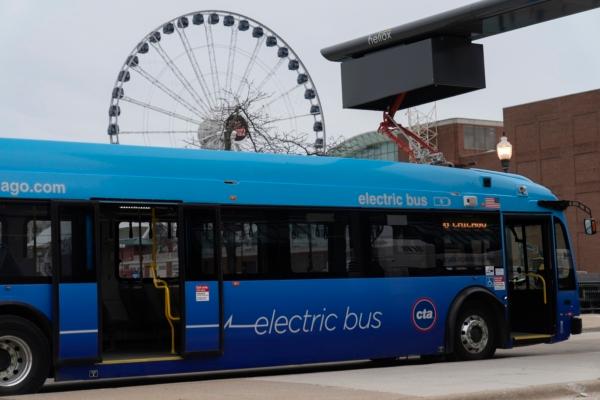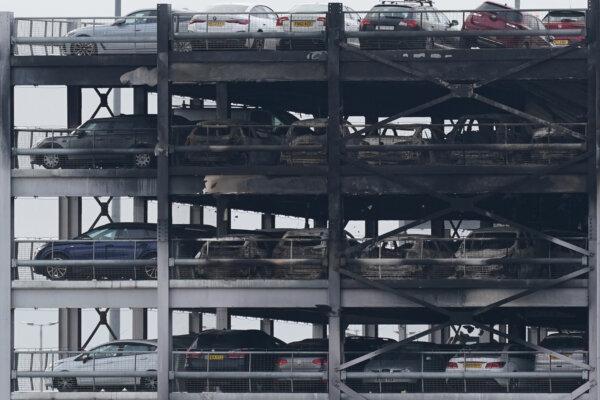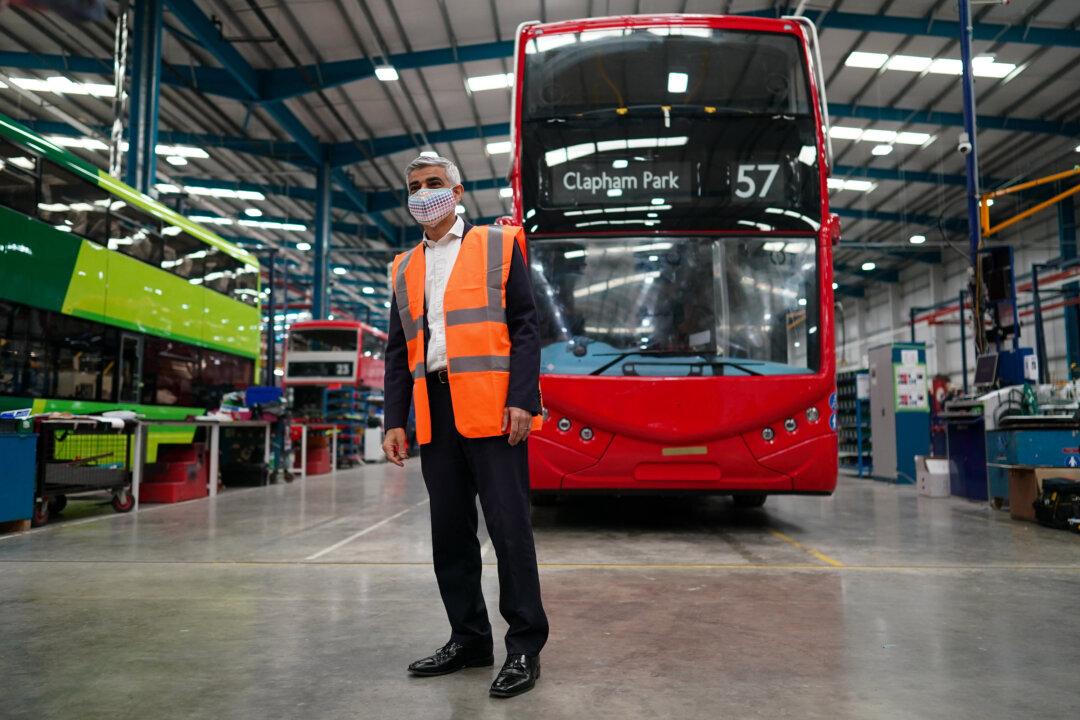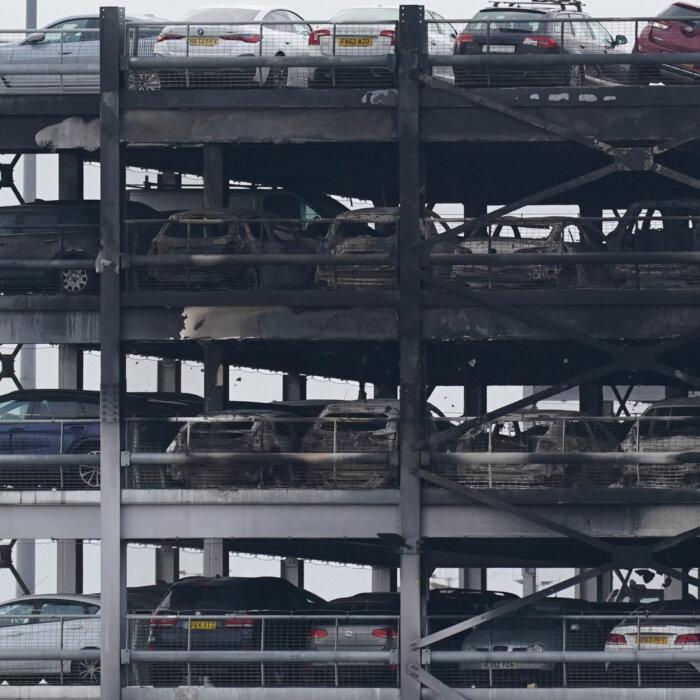A Conservative MP who has been campaigning against plans to build an electric bus garage underneath a residential skyscraper in north London says the government, in its rush to meet net zero targets, has not recognised the inherent fire risks posed by lithium batteries.
Bob Blackman, who is chair of the All Party Parliamentary Fire Safety and Rescue Group, said, “There’s a huge fire safety risk, and you could get to a position whereby a block of flats could literally collapse under the circumstances, which doesn’t bear thinking about.”
He said: “Lithium is one of those chemicals which burns at a very high temperature ... and adding water to lithium is not a good plan either ... It is a very high risk, and our problem is that the technology and safety is not yet proven.”
Asked if he thought the government was doing enough to address the issue, Mr. Blackman told The Epoch Times: “No. I don’t think they have and Maria Miller, my colleague, is championing this cause because in her constituency, there’s a storage facility for these lithium batteries, which is a severe fire risk and she is trying to get greater regulation of of this technology.”
Property developers Ballymore has drafted plans to “carefully rejuvenate” the centre of Edgware—a suburb of north London—with a new cinema, library, shops and restaurants and 3,365 new homes in 25 tower blocks.
But the most controversial aspect of the proposal is the plan to build a “transport hub”—a bus station, with buses being stored and charged overnight at the basement level—under one of the residential towers.
‘Grenfell on Steroids’
But Anuta Zack, spokesman for Save our Edgware, told the Telegraph in October a battery fire in the bus garage could result in “Grenfell on steroids” and residents living in the building above would face “severe risk.”In a statement the group put out earlier this month, they said, “Save Our Edgware, a local residents’ group, has raised serious concerns about the fire risk of the Ballymore/TfL plan to charge at least 190 electric buses in an underground garage, potentially endangering 7,000 residents living in high-rise tower blocks above.”
A spokesman for the Ballymore/TfL joint venture told the Telegraph, “The garage would only be occupied by electric buses following approvals from all relevant bodies, including the London Fire Brigade, Barnet Council, the Health and Safety Executive and building control.”
Mr. Blackman, who represents the neighbouring Harrow East constituency, said he understood TfL had now withdrawn its support for the proposed underground bus garage amid concerns raised by London Fire Brigade.
If a petrol or diesel-powered internal combustion engine (ICE) ignites, it can be extinguished fairly quickly by the fire brigade using conventional hoses, but that is not the case with electric vehicles, which are powered by lithium battery packs—built into the chassis—which can go into “thermal runaway” for a number of reasons.
Matt Humby, a senior technical consultant at fire extinguisher manufacturer Firechief Global, told The Epoch Times: “They are very challenging to put out once they go into thermal runaway. We’ve seen lithium battery modules burn underwater. So you will actually get flames visible underwater.”
“Water will cool but it won’t necessarily stop that thermal runaway event. Each cell will go into thermal runaway so you’ve got a domino effect. What you have to do is stop that domino effect. Eventually, with with up to, for example, 30,000 litres of water it will cool the battery module sufficiently for an electric vehicle to put that battery fire out,” he added.
Mr. Humby said it was not just new buildings which were vulnerable to lithium battery fires in electric vehicles.

He said: “I’ve been in the car park underneath Canary Wharf and there are banks of Teslas being charged, in the underground car park there.”
Will it Take ‘Major Disaster’ for Legislation to Change?
“The trouble is, it’s like anything, until a major disaster happens, it doesn’t set tend to change regulations,” he added.“It will probably take one or two, and we don’t want any disasters, but the trouble is until something like that happens, legislation suddenly then changes, like we saw with Grenfell, which was absolutely terrible,” said Mr. Humby.
“In my opinion, you have to anticipate problems rather than wait for a terrible disaster,” he added.
Mr. Blackman said the proposal at Edgware would have been the first underground electric bus garage of its kind in the world and he said, “There’s a chance that ... one of these electric buses or other such vehicles could burst into flames.”
“As time goes on, the battery technology will improve. But I don’t think you can take the risk at this point in time. We certainly don’t want to be the first to try this out and experience what may happen,” he added.
Mr. Humby hosted a webinar last week during which he showed an incident in China in which the lithium battery in an electric bus went into “thermal runaway” and rapidly spread to several other parked buses in an open-air bus garage.
He said he did not know the cause of the China bus fire but he said: “Electric vehicles will have Original Equipment Manufacturing faults on batteries. It’s rare, but some of the leading manufacturers will have had faults. They’re doing recalls.”
Sadiq Khan Speeding up Electric Bus Switchover
In Sep. 2021, the mayor of London, Sadiq Khan, announced all new TfL buses in London would be zero-emission and committed to making the entire fleet zero-emission by 2034. Almost all of those buses are expected to be fully electric.The Potters Bar fire took place in the open air, but there are concerns about what would happen if electric buses caught fire underground or in an enclosed space beneath a residential building.

Ongoing Investigation Into Luton Airport Fire
Bedfordshire Fire and Rescue Service (BFRS) said there was an ongoing investigation into the incident and their report would not be released before April 2024.A BFRS spokesman told The Epoch Times: “At this time, we can confirm the vehicle involved was a diesel-powered vehicle. To further clarify it was neither a fully electric vehicle nor a plug-in hybrid electric vehicle. More information on the incident and cause of the fire will be released once the investigation has been concluded.”
Bob Bull, from the Alliance of British Drivers, said he doubted the official version of events and said: “Diesel cars would not burn like that. I think it was a diesel hybrid. It was clearly a fault and they have kept it quiet.”
He told The Epoch Times: “I’m not against electric vehicles but they should not be forced on people when the technology is not ready. The batteries are not appropriate. They are very heavy and susceptible to temperature changes.”
Mr. Bull said the government and the motor manufacturers were both determined, for different reasons, to foist electric vehicles on the public.
“The government and car manufacturers have got their heads down this hole and have no choice but to keep going,” said Mr. Bull, who said he believed there was no appetite for electric vehicles among the British public.
A Home Office spokesperson said, “The government is committed to ensuring fire services have the resources they need to keep the public safe, and in 2023/2024 they will receive around £2.6 billion.”
“We are reviewing the incident reporting system and considering the collection of data on fires involving lithium-ion batteries, electric vehicles, e-scooters and e-bikes,” the spokesperson added.
Barnet Council said it had not yet received a planning application from Ballymore for the Edgware development.
The Epoch Times contacted Ballymore but they declined to comment.







